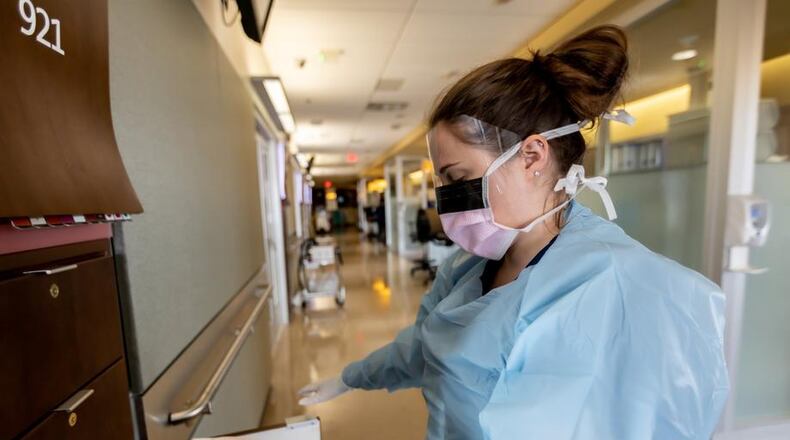At the town hall officials from hospitals, public health and mental health services based in Montgomery, Clark, Darke, Shelby and Auglaize counties spoke about the lessons learned from the COVID-19 pandemic and what they’ve done to bolster infection control in the wake of COVID-19, the disease caused by the novel coronavirus. They also discussed the big increase in telehealth and the mental health challenges posed by the pandemic.
Coronavirus: Complete coverage
Hospitals and physician offices had to curtail nonessential services under orders issued by the state in March in an effort to keep people at home as much as possible and to conserve health care resources and personal protective equipment.
“That was very instrumental in keeping some of the COVID-19 at bay,” said Dr. Erica Taylor, pediatric hospitalist at Dayton Children’s Hospital.
The state rules resulted in people holding off on getting medical care and some hospitals had to furlough workers in areas not involved in COVID-19 treatment.
RELATED: Missing stroke, heart attack patients alarm local doctors
During that period after the March order, hospitals in Ohio lost $2.3 billion, Hackenbracht said.
Data for furloughs and call-backs by area hospitals was not available by deadline.
“Hospitals never limited their services because they were not safe places to be,” Hackenbracht said in remarks released before the town hall. “With the shared goal to serve patients, staff and this incredible community each and every day, our hospitals are open, safe and ready to meet your health care needs. Our region’s hospitals will remain vigilant and continue to work together to make sure we are ready for any challenges that may come.”
Hospital and physician offices are now allowed to resume non-elective procedures and many of those who spoke at the town hall offered reassurances to people that they will enter hospitals and physician offices with a variety of new systems in place to protect them from COVID-19.
RELATED: Coronavirus: Will workplaces ever be the same?
“To put it plainly we are here to help people in the Dayton area lead healthy lives,” said Brenda Kuhn, chief quality officer at Kettering Health Network.
Adam Groshans, president of Mercy Health in Springfield, said lessons learned from sister sites in places that had COVID-19 surges improved treatment plans, guided use of gowns and ventilators and led to improved air filtration systems. Coordination with Clark and Champaign county public health districts was especially helpful with resource support and specimen collection, Groshans said.
Changes were made at hospitals to keep people who might have infectious diseases like COVID-19 away from patients with other ailments, said several speakers. For example, people are screened before they enter the hospital and those who might be infectious are kept separate from other patients, said Dr. Darin Pangalangan, chairman of the Emergency and Trauma Institute at Premier Health. He said everyone gets a face mask. Some chairs have been removed in waiting rooms to promote social distancing and changes were made to reduce wait times to 15 minutes, he said.
RELATED: Dayton region has highest coronavirus spread rate in Ohio, new numbers show
Several of those who spoke said the pandemic brought increased collaboration between hospital systems and government entities that they think will last beyond the pandemic.
“There have been a lot of people coming together to talk about how we knit this together as a community,” said Helen Jones-Kelley, executive director of the Montgomery County Board of Alcohol, Drug Addiction and Mental Health Services.
She said the pandemic is another stressor on a community that has already endured multiple tornadoes across the region and a mass killer in the Oregon District in 2019.
Drug overdoses have increased, Jones-Kelley said, and she wants people to know that help is available, including telehealth options that previously were not permitted under federal rules. She said the Get Help Now Montgomery County app is a good way to access resources and people who just need someone to talk to can call the Warmline phone number at 937-528-7777.
Efforts are also underway to understand and address the racial disparities in COVID-19 cases, said Jeff Cooper, Montgomery County health commissioner. He said the county overall has one case of COVID-19 for every 672 residents. For white residents it is one in 1,000 and for black residents it is one in 489.
Officials are working to reach out to racial and ethnic minorities and non-English speaking people to make sure they are getting information about COVID-19 and to link them with testing, he said.
“(The) focus on equity, that’s going to be a central challenge for us as we move forward,” Cooper said.
Protesters in Huber Heights denounce racism and police brutality
Demonstrators gather in Yellow Springs to protest death of George Floyd
How to talk with your kids about unrest, racism: ‘Be honest’
Small businesses need grit, creativity and cash to survive coronavirus
How Dayton region small businesses adapted to survive
Former state Rep. Clayton Luckie released from federal prison
About the Author




